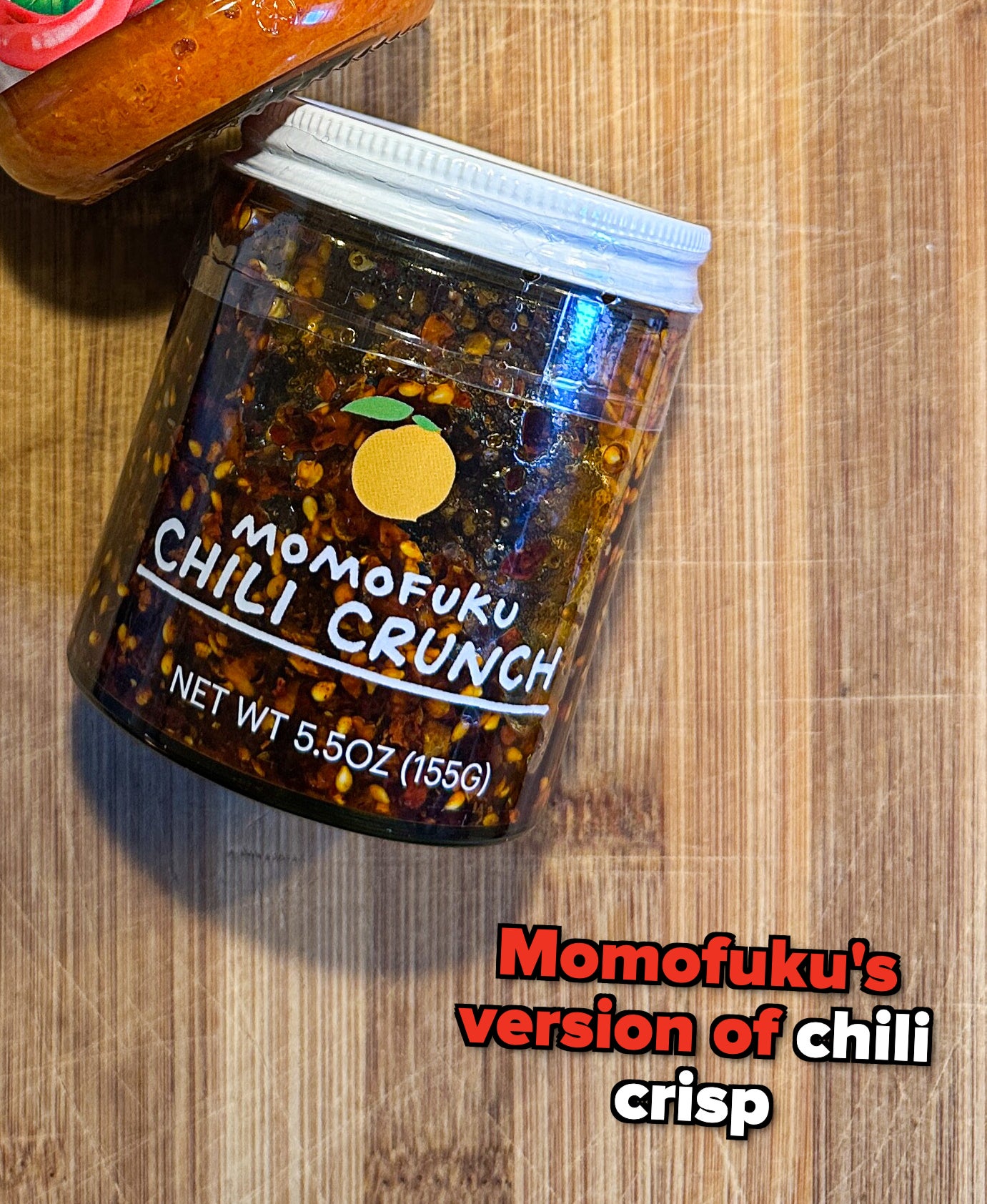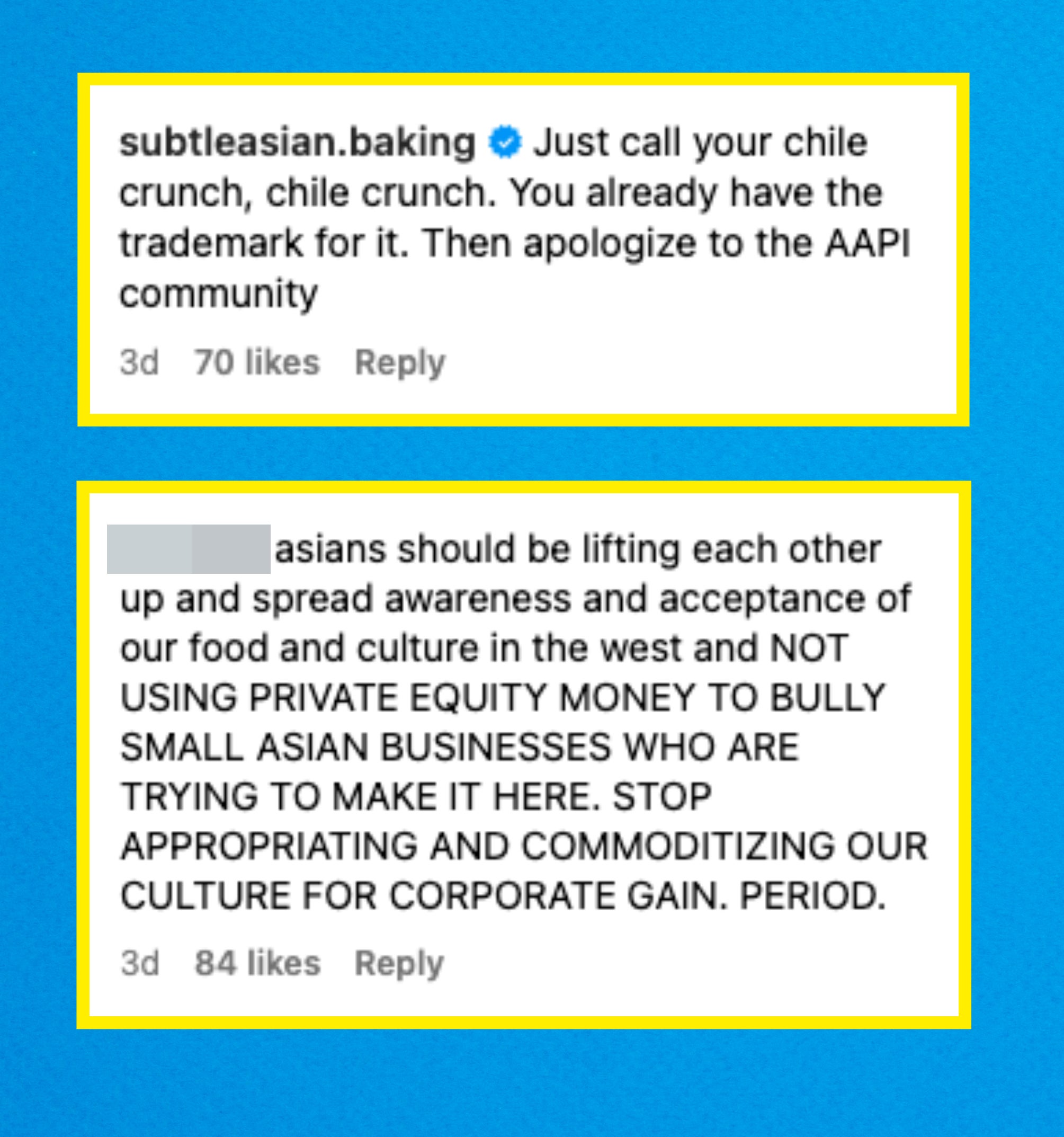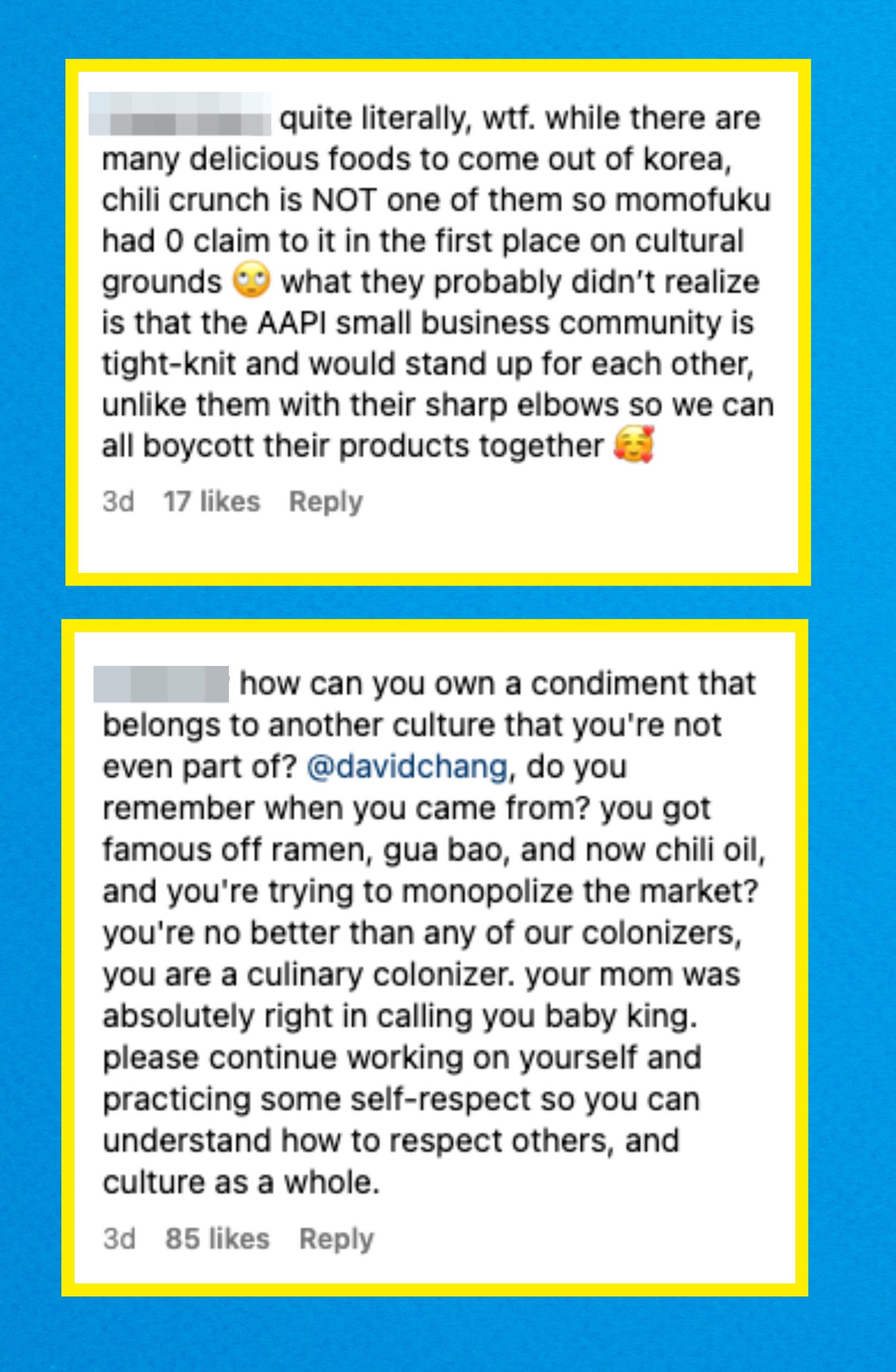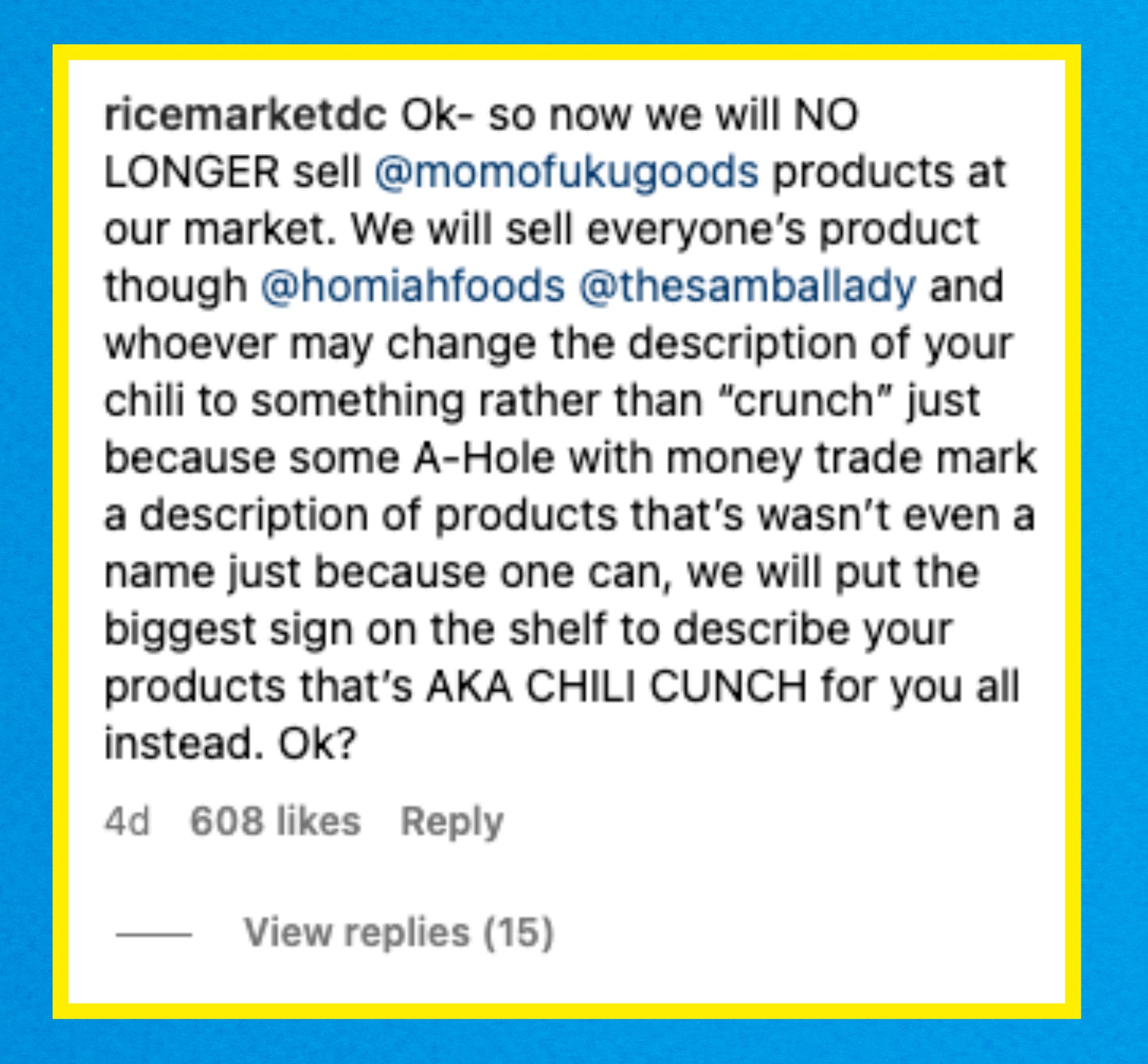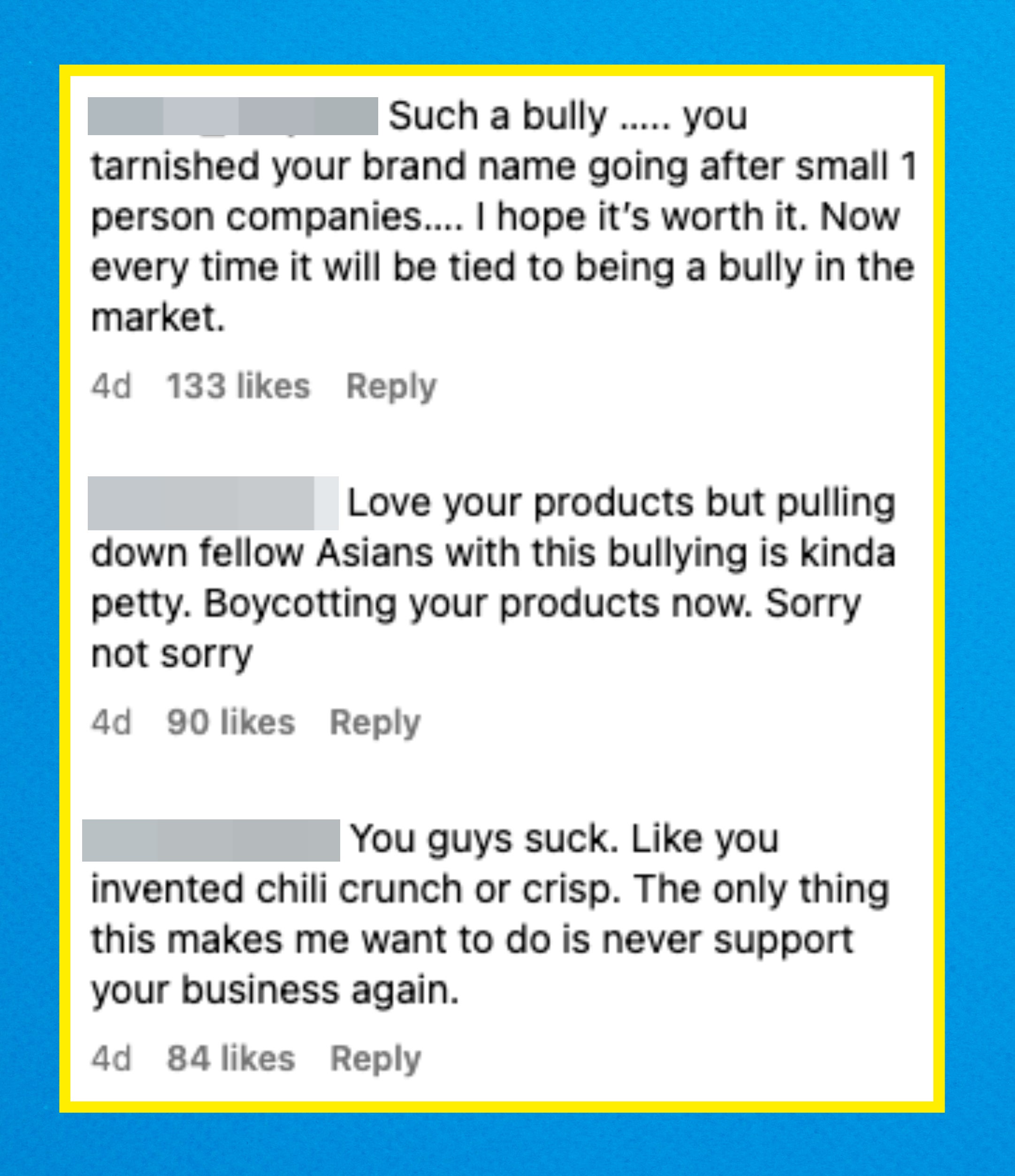" judge to claim ownership of it is like trying to lay claim ' catsup ' or ' mayonnaise . ' "
Note : This stake was updated on Wednesday , April 10 to include a program line from a Momofuku interpreter .
If you’re a food lover, you’re probably familiar with David Chang. As one of the most visible celebrity chefs of our time, Chang is perhaps best known for founding the Momofuku restaurant group in 2004, which sparked nearly two decades of TV shows (like Netflix’sUgly Delicious), media appearances, and books.
In 2018, he launched the brand’s consumer packaged goods line, Momofuku Goods, which sells Asian-inspired groceries like “restaurant-grade” soy sauce and air-dried instant noodles. Shortly after launching, the brand added “chili crunch” to its roster to capitalize on Americans' rapidly growing appetite for chili crisp, a sweet and spicy, umami-packed chili oil condiment that’s been a household staple in China (and many other Asian countries) for centuries.
Late last week, David Chang, Momofuku, and their chili crunch offering became the main characters in a heated PR crisis. On Thursday, the Guardianreportedthat Momofuku sent cease-and-desist letters to at least seven companies that branded their condiments as “chili crunch” or “chile crunch” as they attempt to trademark the former with the US Patent and Trademark Office.
It ’s worth notice that Momofuku has owned the trademark rights to " chile crunch " since last yr as part of a legal settlement with Chile Colonial , a Denver - based company that produces a Mexican translation of chili pepper crisp ( similar tosalsa macha ) — to which Momofuku now certify the " chile crush " trademark .
Homiah, a brand that sells a Malaysian sambal chili crunch product, was seemingly one of the first companies to make news of the cease-and-desist public. Founder Michelle Tew told the Guardian that the letter claimed Homiah’s product to be a “trademark infringement” and that the company had 90 days to cease using the “chili crunch” trademark.
In the caption to an Instagrampost, Tew expressed how “shocked and disappointed” she was to be legally threatened by “a well-known and respected player in the Asian food industry” — all for “selling a product that is part of [her] family’s history and culture.”
MìLà, a company specializing in frozen soup dumplings and founded by husband-and-wife team Caleb Wang and Jen Liao,posteda similar statement on Instagram after receiving their own cease-and-desist from Momofuku, stating that there’s “plenty of room for others to share their authentic flavors and cultural experiences.”
Jing Gao, founder ofFly By Jing(and frequently cited as one of the most central figures in popularizing chili crisps in the States), has also publicly spoken out against Momofuku in recent days throughInstagramand her Substack newsletter — though, according to theLA Times, Fly By Jing recently applied to trademark “Sichuan chili crisp” and “Chengdu crunch” before withdrawing the applications shortly after.
Others focused on the hypocrisy of Chang, a Korean American chef, seeking to trademark the name of a condiment with Chinese roots, insinuating that Chang “got famous” off of non-Korean foods and is now trying to “monopolize the market.” (In case you didn’t realize: The entire Momofuku empire is a nod to Momofuku Ando, the Taiwanese Japanese inventor who created instant noodles and founded Nissin Foods.)
Several small Asian markets and grocers (likeRice Marketin Washington, DC) also pledged their commitment to no longer sell Momofuku Goods products in their stores as a result of the company’s decision.
As the drama made its way to X (aka Twitter) and TikTok over the weekend, even more discourse ensued — particularly among AAPI creators and public figures. In atweetseen by nearly 150,000 X users,Chef Jon Kungsaid that community approval doesn’t matter “if all you want to do is win,” nodding to Chang’s money-amassing Momofuku empire; last year, Momofuku Goods alonebrought in $50 million.
Momofuku brand chili compaction read that having the approval of your community does n’t weigh if all you want to do is win . He did n’t need to be the right . He does n’t require to be respected by AAPI . He wants to be the who white suburbanites reach for when they ’re at Erewhon .
Additionally, nearly half a million X users saw Simu Liu’s viral tweet challenging Momofuku to a “blind taste test of both [their] ‘chili crunch’ sauces.” (Simu Liu is,as of last year, the previously-mentioned MìLà’s Chief Content Officer.)
Hey@momofuku , I take heed you ’re bullying businesses over use of the terminal figure ' chili crunch ' . As Chief Content Officer of MiLa , I nominate a blind gustatory sensation mental test of both our ' chili crunch ' sauces . succeeder keeps the name , also-ran ( it ’ll be you ) back off . Game on ? ;) https://t.co/jidHIBQzf3
Ina replyto another X user, he reiterated that there’s “room for all in the marketplace,” and that Momofuku’s attempt to trademark chili crunch “is like trying to claim ‘ketchup’ or ‘mayo.'”
Appreciate it :) Asiatic chili crunches really foredate all of our patronage and will endure long after . assay to claim ownership of it is like render to claim ' ketchup ' or ' mayo ' . There ’s way for all in the marketplace , from the mom and pops to the MiLas and Momos !
His point is one that’s very much worth considering. Sure, chili crisps or crunches (or whatever other descriptor you could toss in) may not carry the same weight as ketchup or mayonnaise here in the States. But judging by the condiment’sburst in popularityover the past few years, it might not be far off from reaching the status of another well-known Asian condiment that once took the United States by storm: sriracha.
David Tran, the Vietnam-born founder of Huy Fong Foods (the first company to popularize the Thai-inspired sriracha hot sauce condiment in the US), never attempted to trademark “sriracha.” Instead, he trademarked the logo, including the iconic rooster and green cap. He even claimed that his brand had received “free advertising” over the years thanks to unrestricted use of the word sriracha. Throughout the recentHuy Fong sriracha shortage— a dark time in my household! — we saw that free advertising played out in real time. With minimal quantities of Huy Fong sriracha sauces available globally, peoplestillcraved the “original” despite having access to some uber-delicious, newer contenders in the sriracha market.
According to Stephen Coates, the lawyer representing Homiah, Momofuku’s decision to target smaller businesses with limited cash lying around to fund a lawsuit is by design. “This is a clear case of them picking on small businesses with a letter campaign, hoping they’ll cave because of the financial pressure,” he told the Guardian. “The phrase that I would use to refer to Momofuku, in this case, is a trademark bully.”
If there’s one sneaky silver lining of this dispute for everyone who’snotMomofuku, it’s the enhanced visibility and reach that comes with such a public battle. As consumer branding and marketing expert@shwinnabegosays in aviral TikTok, social media users (and chili crisp fans) everywhere are now making a concerted effort to support the brands affected. “David Chang’s bullying of these other chili crunch brands is possibly one of the better things that could happen to them,” he says.
David chang ’s trademark battle with the term chili con carne crush is not boding well for him or momofuku#momofuku#branding#chilicrunch
Case in point: People are using their platforms to boost AAPI-run chili crisp businesses, and as a result, some are noticing increased visibility and brand awareness.
ensure you all check out all these amazing AAPI - hightail it small business , each with their own scrumptious chili crunch sauces : pic.twitter.com / fWici2UOEp
On Wednesday morning, a spokesperson for Momofuku responded to BuzzFeed’s request for comment. Here’s what they said:
" At Momofuku we ’ve made it our military mission to increase the variety of the American palate — through restaurants and now through our home cooking products . We ’re gallant to suffer aboard so many AAPI - founded mark establish tremendous and long - overdue changes in the space .
Over the preceding twelvemonth , we have visit multiple businesses that sell chili frizzy products rebrand themselves to use the discussion Chili Crunch . From day one , we have said we ’re lofty to join this unbelievable tradition of crunchy - spicy sauces from around the world . That remains straight . When we produce our product , we need a name we could own and intentionally picked “ Chili Crunch ” to further specialize it from the extensive chili nipping category , speculate the uniqueness of Chili Crunch , which blends flavour from multiple culinary tradition . We worked with a family - own company called Chile Colonial to purchase the trademark from them . They have defended the stylemark previously against companies like Trader Joe ’s .
Setting this precedent is authoritative to defend brand make innovative strides in Modern categories from having their body of work copied by much larger players . bankruptcy to defend our earmark against any size of it company would leave us without recourse against these big players who often attempt to enter categories on the rise . Our purpose has never been to dampen foundation in a category that we care deeply about .

As we ’ve said in our engagement with these companies , our goal is and has been to ascertain an amicable resolution — not to harm the competition that makes this category so vibrant . And that is what we ’re taste to do . "
